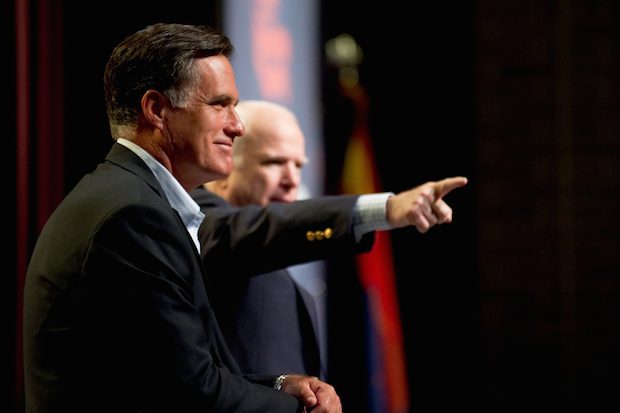Foreign Policy Hawkishness Is a Dead End for the GOP

Former Romney campaign adviser (and sometime MEK booster) Mitchell Reiss reminds us why Romney was so incompetent when it came to foreign policy. Here is his revisionist account of Romney’s blunder in relation to the Cairo protests and the Benghazi attack:
A more sustained focus on world affairs might have prevented the Romney campaign from committing one of its most serious errors: the mishandling of the Benghazi tragedy, when four American officials, including Ambassador J. Christopher Stevens, were murdered by Islamic terrorists. In the pressure cooker of a tight race, the Romney campaign initially rushed to judgment before the situation was clear and many of the facts were known.
There are a few reasons why Reiss is wrong about this. First, the decision to try to make political hay out of what happened in Cairo and Benghazi in September 2012 was a deliberate one that stemmed from Romney’s belief that he could exploit such a situation to his advantage. Because Romney was invested in the idea that Obama was another Carter, he said that he would try to take advantage of a foreign policy crisis if it came up:
It’s really a, but…by the way, if something of that nature presents itself, I will work to find a way to take advantage of the opportunity.
Far from being a candidate that wasn’t paying much attention to foreign policy, Romney was clearly eager to exploit any crisis that came along. Romney was trying to force those events into the foreign policy narrative he had been pushing for years at that point, and it blew up in his face. His error did not come from paying too little attention to foreign policy, but was a direct result of assuming that he could use these issues to inflict political damage on Obama. He was horribly wrong about that because he was horribly wrong about most foreign policy issues, and his instinct to attack during a crisis was more evidence of his impressive political incompetence. He had previewed his poor judgment on this score when he tried to seize on the negotiations over Chen Guangcheng to score some cheap points, and he ended up being embarrassed in that case as well. Worst of all, Romney reportedly recognized the mistake he had made on Cairo and Benghazi, but didn’t retract his claims for fear of how hard-liners in his party would react:
His advisers told him that, if he took back his statement, the neoconservative wing of the party would “take his head off.” He stood by it during an appearance in Florida.
Time after time, Romney dug himself deeper into a hole by trying to win on foreign policy issues where he had no advantage and no particular insight. He earned the ridicule he received, and offered Republicans a clear example of what not to do when running for president. Reiss insists throughout his piece that foreign policy was unduly neglected by the Romney campaign in the 2012 election, but that is exactly wrong. Romney spent an inordinate amount of time talking about the subject during his campaign, and almost every time he said something or issued something in writing it only reconfirmed that he didn’t know what he was talking about or was simply regurgitating hawkish talking points. Reiss is arguing that future Republican candidates do more of the same, and most of them will probably follow this advice, but it won’t lead them to victory.
Comments